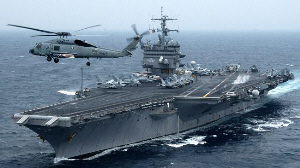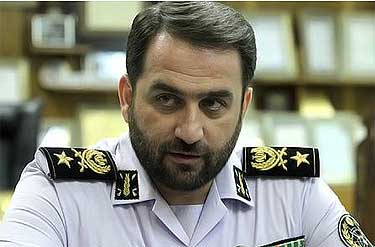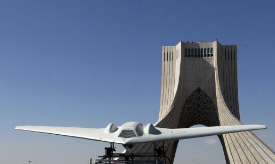A senior Iranian military commander says Iran’s stealth surveillance aircraft photograph US aircraft carriers and other warships cruising the waters off Iran
 While the Commander of Iran’s Khatam al-Anbiya Air Defense Base Brigadier General Farzad Esmaili insisted that US drones had been unable to fly over Iran, he declared Tuesday that Iranian unmanned aerial vehicles operated have flown over US aircraft carriers deployed in the Persian Gulf and have taken photos of them.
While the Commander of Iran’s Khatam al-Anbiya Air Defense Base Brigadier General Farzad Esmaili insisted that US drones had been unable to fly over Iran, he declared Tuesday that Iranian unmanned aerial vehicles operated have flown over US aircraft carriers deployed in the Persian Gulf and have taken photos of them.
"No surveillance unmanned aircraft has passed over Iran, and published photos were been (taken) by satellite systems," he was quoted as saying.
 The Iranian commander dismissed a recent report by the Washington Post which claimed that the CIA had dispatched drones into the skies over Iran and taken photos of Iran’s nuclear sites, saying that such images have indeed been captured by US reconnaissance satellites and not CIA stealth drones, Press TV reported.
The Iranian commander dismissed a recent report by the Washington Post which claimed that the CIA had dispatched drones into the skies over Iran and taken photos of Iran’s nuclear sites, saying that such images have indeed been captured by US reconnaissance satellites and not CIA stealth drones, Press TV reported.
The Telegraph has also posted a report Monday in which its Middle East correspondent, Adrian Blomfield, stated that “the US navy announced the arrival of the USS Abraham Lincoln in the north Arabian Sea and the USS Enterprise, the world's longest naval vessel, in the Gulf of Aden.”
 “If any aerial vehicle seeks such an end, its wreckage will be put on public display,” Esmaili warned, adding: “one such drone sought to infiltrate into Iran and you witnessed what happened,” referring to the American captured RQ-170 aircraft when tried to violate the Iranian airspace and capture images of Iran’s nuclear sites in last December.
“If any aerial vehicle seeks such an end, its wreckage will be put on public display,” Esmaili warned, adding: “one such drone sought to infiltrate into Iran and you witnessed what happened,” referring to the American captured RQ-170 aircraft when tried to violate the Iranian airspace and capture images of Iran’s nuclear sites in last December.
However, Blomfield quoted in his report a senior Iranian official as threatening in January unspecified action if American aircraft carriers returned to the Persian Gulf, when he said: “We are not in the habit of warning more than once.”